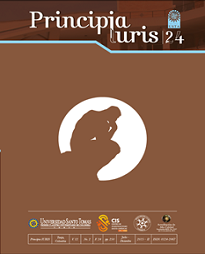THE CONSTITUTION OF RIONEGRO BACKGROUND AND EFFORTS IN CONCRETION OF A POLITICAL SYSTEM FOR COLOMBIA
Main Article Content
Abstract
Article Details
Por medio de esta comunicación certifico que el artículo que estoy presentando para posible publicación en la revista institucional impulsada de la Facultad de Derecho de la Universidad Santo Tomás seccional Tunja, Principia Iuris, es de mi entera autoría, siendo sus contenidos producto de mi directa contribución intelectual.
Todos los datos y referencias a publicaciones hechas están debidamente identificados con su respectiva nota bibliográfica y en las citas que se destacan como tal.
Por todo lo anterior, declaro que el material presentado se encuentra conforme a la legislación aplicable en materia de propiedad intelectual, y por lo tanto, me hago responsable de cualquier reclamación relacionada a esta.
En caso de que el artículo presentado sea publicado, manifiesto que cedo plenamente a la Universidad Santo Tomás seccional Tunja los derechos de reproducción del mismo y accedo a las modificaciones que de forma se requieran para adaptarse a la estética de la revista. Como contraprestación de la presente cesión, declaro mi conformidad de recibir (2) ejemplares del número de la revista en que aparezca mi artículo.
References
Bolívar, Simón. (2012). Carta de Jamaica. Coordinación de Humanidades, Centro de Estudios Latinoamericanos, Facultad de Filosofía y Letras, Unión de Universidades de América Latina, Centro de Estudios sobre la Universidad, Universidad Nacional Autónoma de México.
Cruz S., A. (1978) “Federalismo y Centralismo”, Bogotá, Breviarios Colombianos.
Martínez G., A. (2012) “José Joaquín Camacho y su influencia en la Constitución de la Provincia de Tunja (1811)”. Tunja, En: Revista “Historia y Memoria” No. 5. Doctorado en Historia. Facultad de Ciencias de la Educación. UPTC.
Simposio de Historia Regional “Pamplona 445 Años”, Mogollón, P. M. C., Pabón, V. S., Pamplona (Norte de Santander, Colombia), & Fondo Mixto de Promoción de la Cultura y las Artes del Norte de Santander. (1994). Memorias. Pamplona, Norte de Santander, Colombia: Alcaldía, Ciudad de Pamplona.
Ots, . C. J. M. (1957). El Estado Español en las Indias. México: Fondo de Cultura Económica.
Tigar, M. E., Levy, M. R., & Grab, N. (1978). El derecho y el ascenso del capitalismo. México: Siglo Veintiuno.
Colombia, & Restrepo, P. C. (2009). Constituciones políticas nacionales de Colombia. Bogota: Instituto de Estudios Constitucionales, Universidad Externado de Colombia.
Rivadeneira, V. A. J. (1962). Historia constitucional de Colombia. Bogotá: Editorial “El Voto Nacional”.
Rosanvallon, P. (2003) Trad. MAYER, M. Por una historia conceptual de lo político. México: FCE.
Rozo, G. J. (1978). Los muiscas: Organización social y régimen político. Bogotá: Fondo Editorial Suramérica.
Samper, J. M. (1886). Derecho público interno de Colombia. Bogota: Impr. de “La Luz”.
Suescún, M. A. (1998). Derecho y sociedad en la historia de Colombia. Tunja: Editorial Universidad Pedagógica y Tecnológica de Colombia.
Uprimny, L. (1954) ¿Capitalismo calvinista o romanticismo semi-escolástico de los próceres de la Independencia colombiana?”. En: Revista Universitas No. 6. Bogotá: Universidad Javeriana..
Valencia, V. H. (1987). Cartas de Batalla: Una crítica del constitucionalismo colombiano. Bogotá, Colombia: Universidad Nacional de Colombia.
Villate, S. G. (2001). Tunja prehispánica: Estudio documental del asentamiento indígena de Tunja. Tunja: Universidad Pedagógica y Tecnológica de Colombia, UPTC.

